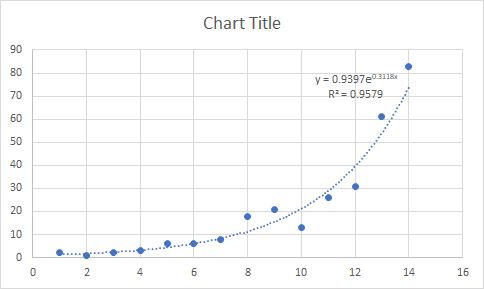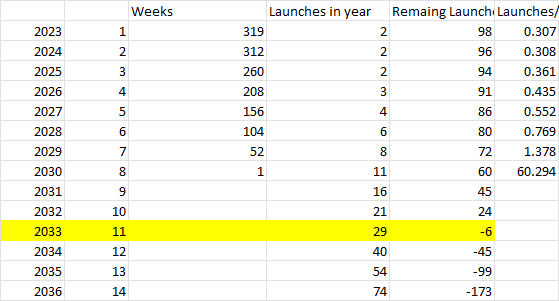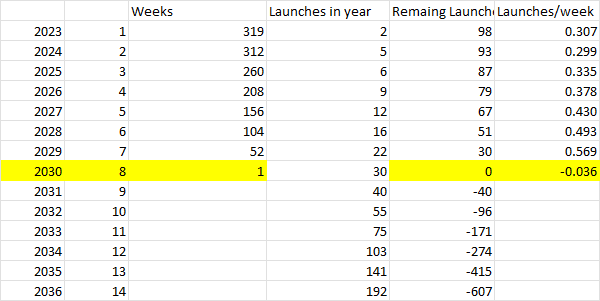
People are also trading
Falcon 9 launch history:

Assuming that launch cadence for Starship with expected 2 launches this year which is reasonable. Gets to 100 launches by 2033

I think this is probably slightly underpredicting the amount of launches considering HLS + Starlink. But Starship launches would need to be about 260% faster than F9 history for it to reach the 100 by 2030 mark. Extremely rudimentary analysis but I think it illustrates the point.

@NGK Also this assumes full stack launches only. @Gigacasting hasn't confirmed whether the hops count since the upper stage is called "Starship" as well as the fullstack being called "Starship" too.
@Nat He’s an inactive user. Maybe just hold a consensus vote now. To be honest I lean towards full stack as per my comment above.
@NGK They still make trades occasionally so not completely inactive and figured I'd might as well ping them but yeah I very much doubt we'll be getting any clarification so I'm happy going with trader consensus
My vote would also be full stack only (and that's coming from a YES holder)
@Alexf3a5 This is insanity. Not only can they not even launch to orbit yet but there is no chance the demand for such amount of launches exist by then too. SpaceX are selling Falcon launches to 2030 now.
@NGK 0.29 launches per week in order to make the 100 launches by 2030 target. 1.46 launches per week to make the 500 launches by 2030 target.
Assuming SpaceX start launching commercial payloads at best Jan 2024 with HLS (Which NASA already expects to be pushed back) and there's only 1 other launch on the manifest for 2024. You're looking at semi regular launches by 2025 with starlink. Then you might make it.
@marktweise I don't know how to count the first IFT. Was it a success because it cleared the tower and gathered data, or should we treat it like we would treat the 500th flight and say they had a plan to splash down in Hawaii and didn't make it because of vehicle malfunction, even if they thought chance of that happening was very low?
I think I would say the counter is still at 0. Even though I think the first launch went well, all things considered.
I think I'll stick with a stricter definition of success.
The guiding principle is kind of "Did the launch give future customers confidence Starship can deliver their payload."
I think a launch should count when a full attempt in earnest was made and the vehicle leaves the pad.
1) Full stack (Starship + Superheavy Booster)
2) Launch timeline counts to T-0
3) Systems initiate startup, engines make fire, and enough thrust to lift off the pad.
Initial prompt just says launch and not mission success or making orbit, and if SpaceX thinks it’s worth the financial and reputation risk to go for it then it’s a significant event.
@Alexf3a5 It launched. It did not stage separate, reach space, reach orbit, etc.
But honestly the approach I would take here is to just define the resolution source for data clearly, and not try to count up individual launches and adjudicate them. Decide to use the Wikipedia page, or the official SpaceX tally, or Johnathan's Space Report, or some other specific and reputable source.
Clarity and certainty are worth far more than trying to count the exact "right" set of launches. Are predictors really doing anything different right now if this question is "99 launches plus the first test launch" vs "100 launches after the first test launch"? I doubt it.